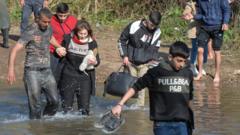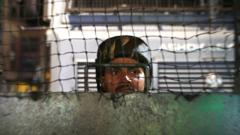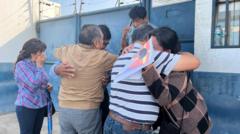The UN documented a shocking rise in civilian killings in Syria's coastal regions, particularly targeting Alawite families in a wave of violence ignited by insurgent retaliation.
**UN Confirms Surge in Family Killings Amid Syria's Escalating Violence**

**UN Confirms Surge in Family Killings Amid Syria's Escalating Violence**
Reports indicate recent sectarian violence has led to the deaths of entire families in Syria, stressing the urgent need for accountability and investigations.
The United Nations has reported a dire situation in Syria's coastal region, where immense violence has resulted in the deaths of entire families, including women and children. The UN human rights office disclosed to reporters that they have verified the killings of 111 civilians since last Thursday, but these numbers are believed to be a portion of the actual toll, with many more incidents likely occurring. A significant number of these cases involve summary executions that appear to be rooted in sectarian conflict, particularly impacting Alawite communities.
Following the ambush of a security patrol by loyalists of President Bashar al-Assad, gunmen supporting a Sunni Islamist-led faction have been implicated in a series of revenge attacks, further escalating the already fragile security situation. Reports from monitoring groups suggest that the death toll exceeds 1,200 civilians, predominantly among the Alawite population in Latakia, Tartous, Hama, and Homs provinces.
The UN praised the commitment made by Syria's interim President, Ahmad al-Sharaa, to establish an independent investigative committee focused on holding accountable those responsible for the violence. This period of turmoil represents one of the worst outbreaks of violence in Syria since Sharaa led a successful offensive against Assad in December, which concluded a 13-year civil war that claimed over 600,000 lives.
The coastal area, primarily home to Alawites—an offshoot of Shia Islam—has seen escalating hostilities, particularly after the death of 13 security personnel during a recent ambush in Jableh. In response, security forces intensified operations, enlisting support from various armed groups, leading to what witnesses describe as revenge-driven massacres in Alawite towns.
According to UN spokesperson Thameen Al-Kheetan, the scale of violence continues to rise, with reports documenting a staggering 90 male fatalities, 18 women, and 3 children among the deceased. Disturbingly, eyewitness accounts suggest that attackers specifically targeted homes based on religious affiliation, sparing or executing individuals based on their identity. Moreover, civilian facilities, including hospitals in Latakia and Tartous, have faced armed incursions from pro-government forces, leading to additional casualties.
The Syrian Observatory for Human Rights corroborated these reports, detailing a rising death toll that now sits at 1,225. The situation remains dire, with around 250 pro-Assad fighters and a considerable number of security personnel also killed in the recent unrest.
In the wake of escalating violence, the UN human rights chief has urged the Syrian government to perform comprehensive investigations into these human rights violations. He emphasized that accountability is crucial for victims and their families, who deserve justice and reparations.
Amid the upheaval, preliminary investigations by Syria's newly created committee are reportedly underway, aimed at collecting evidence over the next 30 days. The state-run media agency has indicated a few arrests related to atrocities against civilians, highlighting ongoing law enforcement efforts.
While sporadic gunfire continues to echo through affected areas, a sense of calm has reportedly settled in certain regions, with residents expressing deep fears about returning home due to trauma and ongoing threats. Many have sought refuge at the Russian-controlled Hmeimim airbase or crossed the border into Lebanon to escape the violence.
Testimonies from survivors reflect a pervasive fear within the Alawite community, with family members recounting horrific acts of violence. A prominent sentiment articulated by a female survivor highlighted a mistaken perception of guilt simply because the Assad regime is Alawite. As the situation in Syria continues to complicate, trust in government entities has diminished, further exacerbating communal tensions and fears among the populace.
Following the ambush of a security patrol by loyalists of President Bashar al-Assad, gunmen supporting a Sunni Islamist-led faction have been implicated in a series of revenge attacks, further escalating the already fragile security situation. Reports from monitoring groups suggest that the death toll exceeds 1,200 civilians, predominantly among the Alawite population in Latakia, Tartous, Hama, and Homs provinces.
The UN praised the commitment made by Syria's interim President, Ahmad al-Sharaa, to establish an independent investigative committee focused on holding accountable those responsible for the violence. This period of turmoil represents one of the worst outbreaks of violence in Syria since Sharaa led a successful offensive against Assad in December, which concluded a 13-year civil war that claimed over 600,000 lives.
The coastal area, primarily home to Alawites—an offshoot of Shia Islam—has seen escalating hostilities, particularly after the death of 13 security personnel during a recent ambush in Jableh. In response, security forces intensified operations, enlisting support from various armed groups, leading to what witnesses describe as revenge-driven massacres in Alawite towns.
According to UN spokesperson Thameen Al-Kheetan, the scale of violence continues to rise, with reports documenting a staggering 90 male fatalities, 18 women, and 3 children among the deceased. Disturbingly, eyewitness accounts suggest that attackers specifically targeted homes based on religious affiliation, sparing or executing individuals based on their identity. Moreover, civilian facilities, including hospitals in Latakia and Tartous, have faced armed incursions from pro-government forces, leading to additional casualties.
The Syrian Observatory for Human Rights corroborated these reports, detailing a rising death toll that now sits at 1,225. The situation remains dire, with around 250 pro-Assad fighters and a considerable number of security personnel also killed in the recent unrest.
In the wake of escalating violence, the UN human rights chief has urged the Syrian government to perform comprehensive investigations into these human rights violations. He emphasized that accountability is crucial for victims and their families, who deserve justice and reparations.
Amid the upheaval, preliminary investigations by Syria's newly created committee are reportedly underway, aimed at collecting evidence over the next 30 days. The state-run media agency has indicated a few arrests related to atrocities against civilians, highlighting ongoing law enforcement efforts.
While sporadic gunfire continues to echo through affected areas, a sense of calm has reportedly settled in certain regions, with residents expressing deep fears about returning home due to trauma and ongoing threats. Many have sought refuge at the Russian-controlled Hmeimim airbase or crossed the border into Lebanon to escape the violence.
Testimonies from survivors reflect a pervasive fear within the Alawite community, with family members recounting horrific acts of violence. A prominent sentiment articulated by a female survivor highlighted a mistaken perception of guilt simply because the Assad regime is Alawite. As the situation in Syria continues to complicate, trust in government entities has diminished, further exacerbating communal tensions and fears among the populace.






















